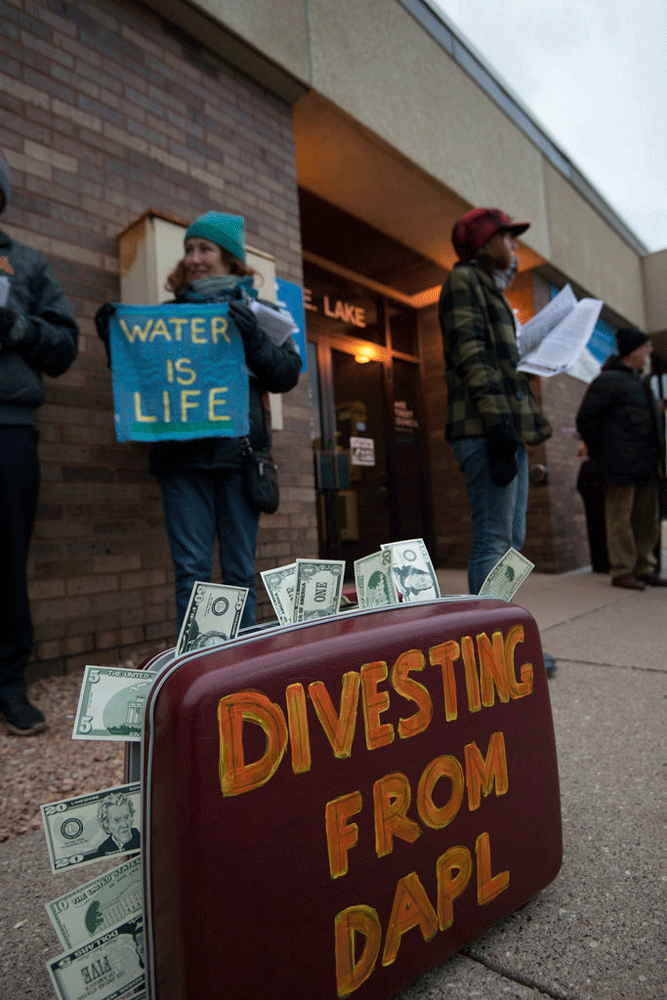
Stephani Anderson
The #NoDAPL campaign is in full effect in Santa Barbara, and stemming from it is Divest SB, a new grassroots organization that grew out of the Santa Barbara Standing Rock Coalition. It’s made up of climate justice activists, local Chumash Elders, and leaders.
“Many family and friends have been traveling back and forth to Standing Rock, but I have chosen to support from here in Santa Barbara,” said Emiliano Campobello, a University of California, Santa Barbara graduate and core member of the SB Standing Rock Coalition. “I support the Standing Rock Nation by uniting with the Barbareño Band of Chumash Indians (BBCI) in organizing events and Interfaith Prayer Gatherings.”
Last summer, members joined the Standing Rock Sioux in their battle to protect water, sacred burial grounds, and legal rights which were threatened by the Dakota Access Pipeline and the fossil fuel industry. The overall goal is to raise awareness in Santa Barbara about #NoDAPL and to connect Standing Rock to Big Oil obstacles here, especially when it interferes with climate justice and Indigenous rights.
“Going forward, we hope to motivate more people to join the climate justice and indigenous rights movement, to individually divest from the banks funding the Black Snake,” said Grace Feldmann, co-founder of the SB Standing Rock Coalition. Feldmann notes that is is crucial to engage elected officials in order to accomplish “expedited needed changes” that can help our planet and “advance a truly just socio/economic system.”
So far, Divest SB has completed one out of two steps by asking the city to issue a “Statement of Solidarity” with the Standing Rock Sioux. Alongside the Chumash elders, members created a resolution, delivered speeches, and passed the resolution with the help of Councilmember Cathy Murillo and Mayor Helene Schneider on Nov. 1, 2016. Now, this group is striving for “individual divestment” through #BankExit rallies from Nov. 2016 to Mar. 2017.
Currently, Divest SB is trying to reach the next part of the process. They are asking the city to divest from banks that fund DAPL and want to create a Socially Responsible Investment (SRI) policy. This would provide for social and environmental criteria when bank contracts are considered.
Divest SB uses Bank Exits to target companies like Wells Fargo, Bank of America, Chase, Union Bank, and other local banks because they are connected to the Dakota Access Pipeline. They assist people with account closure and talk with officials about divestment’s purpose and what expectations need to be met for customers to return.
“This is a battle to stop profit-minded, short-sighted corporations from extracting resources at the expense of others, often the already marginalized indigenous populations of our country,” Campobello added. “Standing Rock has taught us that we must stand strong together and recognize the rights of Mother Earth, and that we must care for her if she is to care for us.”
The organization is working hard to circulate an endorsement letter and signatures from other groups to back the city divestment. Further, they are working to schedule meetings with council members. Divest SB asks the public to write letters to individual city council members about the cruciality of divestment.
“We are in a climate emergency,” Feldmann said. “Our window to transition off fossil fuels and get greenhouse gas emissions low enough to keep the planet habitable is closing. Divesting from the institutions funding the fossil fuel industry helps push the industry away from deadly expansion.” She points out how matters are so vital and time sensitive because the planet’s health is exploited.
Feldmann also believes that indigenous people have been actively and unfairly ignored and marginalized. In her opinion, there is insufficient consultation around the use of native land. These people’s rights are devalued and the Standing Rock Sioux sacred burial grounds have been disrespected by the energy industry, according to Feldmann and other activists. This is why Divest SB supports that indigenous people need to be included in any decisions that impact their land, lives, and culture.
Over the next summer, Divest SB hopes to have a website that provides easy access to upcoming resources and campaigns. More information on Divest SB and their #NODAPL involvement can be found on their Facebook page.










